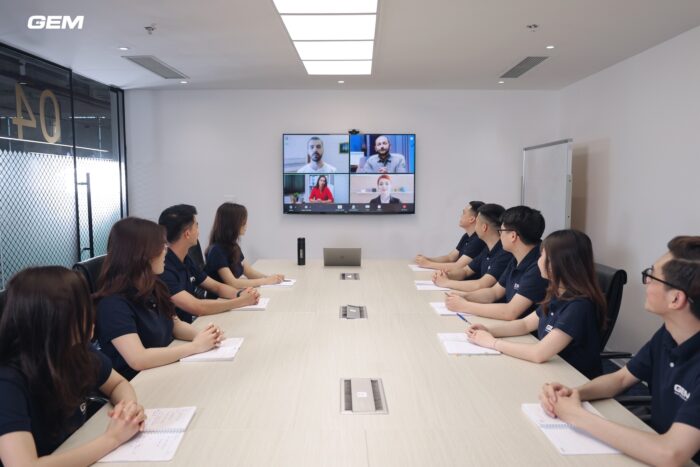Contents
Quantum computing promises a future where complex problems are solved at lightning speed.
But why haven’t we seen widespread commercial use of quantum computing in the business world? How does the future look for its potential? What strategic benefits can we expect once the challenges are resolved?
Curious about other prominent tech trends? Explore our list here!

About quantum computing
First, let’s learn about the fundamental principles of quantum computing and how they differentiate it from classical computing systems.
Definition of quantum computing
Quantum computing leverages quantum mechanics to perform calculations. Unlike classical computers, which use bits that are either 0 or 1, quantum computers use qubits. Qubits can exist in multiple states simultaneously due to superposition, which allows them to represent a range of values between 0 and 1 at once.
Quantum computers can process vast amounts of information simultaneously, enabling them to solve complex problems much faster than classical computers. For example, when solving a maze, a quantum computer can explore all possible paths at once, drastically reducing the time required to find the exit. In contrast, a classical computer must evaluate each path sequentially, which takes significantly longer.
Essential concepts and principles
Quantum computing leverages principles from quantum mechanics to process information in ways classical computers cannot. Let’s explore these core concepts and.
Quantum bits (Qubits)
A qubit, or quantum bit, is the fundamental unit of information in quantum computing, much like a binary bit is in classical computing. While a classical bit can be either a 0 or a 1, a qubit can represent both 0 and 1 simultaneously due to a property called superposition. This means that a qubit can hold and process a vast amount of information compared to a classical bit.
Superposition
Superposition is the ability of a qubit to be in a combination of 0 and 1 states at the same time. Imagine a coin spinning in the air, where it is both heads and tails simultaneously until it lands. Similarly, a qubit in superposition allows quantum computers to perform many calculations at once, increasing their processing power and efficiency for certain tasks.
Entanglement
Entanglement is a quantum phenomenon where qubits become interconnected. When qubits are entangled, the state of one instantly influences the state of another, regardless of distance. This enables quantum computers to process complex correlations between data more efficiently.

What’s taking so long?
Several reasons have been pinpointed for hindering quantum computing from reaching universal commercial use
Quantum decoherence
Qubits, the fundamental units of quantum computing, are extremely sensitive to their environment. Any external interference, such as fluctuations in temperature, electromagnetic radiation, or even vibrations, can disrupt their delicate quantum states. This sensitivity can lead to errors in computations, making it crucial to maintain quantum coherence for accurate and reliable calculations. Without effective methods to preserve coherence, the potential advantages of quantum computing are significantly diminished.
Scalability
One of the major challenges in quantum computing is scaling up the number of qubits while preserving their coherence. As the number of qubits increases, managing their interactions and maintaining their quantum states becomes increasingly difficult. The addition of more qubits often introduces additional errors, which can impact the overall performance of the quantum computer.
Building large-scale, stable quantum computers thus poses a significant engineering challenge, requiring advancements in both technology and materials.
Difficulties in error correction
Quantum error correction presents a unique challenge compared to classical error correction due to qubits’ fragile quantum state, which makes programming, testing, and debugging extremely difficult.
Quantum errors are not only more complex but also harder to identify and correct. Therefore, developing effective quantum error correction codes and, in general, a fault-tolerant quantum system for enterprises will take a significant amount of time.
This process depends largely on the unpredictable progress of ongoing research and development efforts in laboratories worldwide.
Measurement challenges
Measuring qubits without disturbing their quantum state is a significant challenge. The act of measurement in quantum computing collapses the qubit’s state, potentially affecting the outcome of subsequent measurements. Choosing the correct measurement basis is essential for obtaining useful data, but this choice can be complex and challenging. Additionally, repeated measurements can further alter the quantum state, limiting the amount of information that can be extracted from the system.
Extreme operating conditions
Maintaining stable collections of qubits is exceptionally difficult due to the fundamental principles of physics. Qubits are highly unstable and must be kept in a precisely controlled quantum state to minimize thermal noise and maintain superconducting states.
To achieve this, some quantum machines cool qubits to temperatures hundreds of degrees below freezing—colder than outer space—while others use ultra-high vacuum chambers to contain them. Additionally, these systems must be isolated from their environment to prevent unwanted interactions. Consequently, modern quantum machines are custom-designed and predominantly found in laboratory settings.
Maintaining such conditions is not only technically demanding but also costly, which limits the practical applications of quantum computing and presents a barrier to widespread adoption.
Limited practical applications
Despite the promising potential of quantum computing, identifying real-world problems that can be significantly accelerated by quantum computers remains an ongoing challenge. Many potential applications are still in the research and development phase, and it is not yet clear which problems will benefit the most from quantum computing. As research progresses, the practical applications of quantum computers will become clearer, but currently, their use remains largely experimental.

Strategic benefits of quantum computing
Once these challenges are overcome, what are the advantages and values that we can expect from the widespread use of quantum computing in business?
Enhanced problem-solving capabilities
Quantum computing offers remarkable improvements in addressing complex problems. Unlike classical computers, which can struggle with intricate optimization tasks, quantum computers excel in solving problems such as optimizing supply chains, financial portfolios, and logistics. They leverage their advanced algorithms to process and analyze large datasets more quickly and accurately, providing deeper insights and more reliable predictions.
Accelerated innovation and adaptability
By harnessing quantum algorithms, companies can accelerate research and development processes. This technology helps them simulate complex systems with high precision and optimize designs in ways that classical computers cannot match. This capability allows for rapid prototyping and iterative improvements, leading to faster time-to-market for new products and services.
In addition, quantum computing helps businesses rapidly analyze complex data sets to uncover patterns and trends that traditional computers might miss. Therefore, it allows businesses to make data-driven decisions with greater precision and agility.
As a result, quantum computing helps businesses stay ahead of competitors, meet evolving market demands more effectively, and drive groundbreaking advancements in their industry.
Facilitating scalable and efficient operations
Quantum computing can significantly enhance scalability and efficiency in business operations. By solving complex optimization problems, such as optimizing delivery routes or resource allocation, quantum computers enable businesses to manage processes more effectively.
They also improve simulation accuracy, allowing for better resource management and reduced waste by modeling systems and materials more precisely.
The speed and accuracy of quantum computing reduce the time and resources needed for complex calculations, leading to cost savings in areas like risk analysis and financial modeling. Over time, this capability can streamline operations, minimize inefficiencies, and lower costs, making businesses more scalable and efficient.

Future predictions and use cases across industries
In this section, we explore projections about the role of quantum computing in the coming time and what their main use cases would be, before learning more about industry leaders who already have hopped in on the trend.
The four archetypes
The primary use cases for quantum computing can be grouped into four main types: quantum simulation, quantum linear algebra for AI and machine learning, quantum optimization and search, and quantum factorization.
Quantum simulation
This involves using quantum computers to model and simulate complex physical systems, which can provide insights into phenomena that are difficult to study with classical computers.
Quantum linear algebra for AI and Machine Learning
This involves using quantum computing to enhance linear algebra operations, which are crucial for AI and machine learning. It aims to speed up matrix calculations and other linear transformations, potentially improving model training and computational efficiency.
Quantum optimization and search
This refers to quantum algorithms designed to solve optimization and search problems more efficiently than classical methods. It focuses on finding the best solutions from large sets of possibilities, benefiting fields like logistics and finance by leveraging quantum computational advantages.
Quantum factorization
This involves breaking down large numbers into their prime factors, a process that is critical for cryptography. Quantum computers have the potential to perform this task much faster than classical computers.

The future role of quantum computing
With so much of its potential still lying in laboratories, what are the predictions for its future role?
It is expected that quantum computing will become a complementary technology instead of a replacement for classical computers in the future. Quantum computers will probably coexist with traditional systems and specifically be used for highly specialized calculations that classical computers cannot efficiently perform. This is similar to how graphics processing units (GPUs) and central processing units (CPUs) work together, where CPU handles general tasks while GPU supports advanced graphics along with machine learning.
Quantum computing will also combine with cloud services to enhance the cloud. Many organizations are expected to use cloud-based quantum computing for their work. This approach allows them to leverage this specialized power for specific tasks without having to invest in-house in quantum hardware.
A survey conducted by International Data Corporation (IDC) indicates that about 65% of those interviewed have either started using or planning to utilize cloud-based virtualized quantum computing showing its importance among future technologies.

Real-life use cases
However, with substantial financial strength, many giants in different industries have already started harnessing the power of quantum computing.
In finance services
Quantum computing is being applied to enhance risk management strategies in finance. A recent study by JPMorgan Chase demonstrated the use of quantum machine learning to improve deep hedging models. This involves using quantum computers to optimize investment portfolios and reduce risk more efficiently than traditional methods. This breakthrough highlights the potential of quantum computing to revolutionize financial services and provide a competitive edge.
Another well-known provider of financial services that is leveraging quantum computing is Deloitte. Deloitte uses quantum annealers to enhance fraud detection capabilities. Quantum annealers excel at solving optimization problems, which can improve feature selection in machine learning models. This allows for more accurate identification of fraud patterns and reduces the likelihood of false positives.
In weather forecasting
Rigetti Computing has developed a solution that combines classical and quantum machine learning to improve storm prediction. They achieve this by:
- Generating synthetic weather data: Quantum computers are used to create high-quality, artificial radar data that mimics real-world weather patterns.
- Enhancing classical models: This synthetic data is then fed into classical weather prediction models, improving their accuracy in predicting storms.
This research demonstrates the potential of quantum computers to be integrated with existing workflows and provide real-world benefits in weather forecasting.
In medicine
Fujitsu has partnered with the Barcelona Supercomputing Center to leverage quantum computing in the field of personalized medicine. This project aims to advance precision diagnostics by analyzing a wide range of data, including genomic molecular characteristics and detailed X-ray image features. Quantum computing will be employed to process and interpret these complex datasets, enhancing the accuracy of disease detection.
In manufacturing
Quantum computing is being used in manufacturing, specifically for improving metal forming processes.
To be more specific, BMW Group is collaborating with Pasqal to enhance its metal forming simulations through quantum computing. Quantum technology is being applied to solve complex differential equations involved in simulating material deformations. This approach aims to provide rapid and accurate modeling to improve the manufacturing process by enabling better simulation of car parts without physical prototyping.
The goal is to achieve more precise simulations, which could lead to the production of lighter, more fuel-efficient, and safer car components.

Closing remark
Although quantum computing is still in its early stages, its potential to revolutionize industries is undeniable. It offers transformative possibilities in finance, healthcare, weather forecasting, and manufacturing.
As research and development continue to progress, we can expect to see increasing collaboration between academia, industry, and governments to accelerate the development and adoption of quantum computing.
GEM – Your trusted digital partner
GEM has had over 10 years of delivering high-quality digital services to empower industry giants around the globe. Therefore, no matter your industry, we have the tools and expertise needed to enable your organization.
Connect with us to see what technology best serves your digital ambitions!
Error: Contact form not found.





